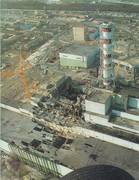The children who died and still are suffering from the Chernobyl nuclear disaster was in focus at an interfaith ceremony arranged by the World Council of Churches and Green Cross International at the Ecumenical Centre in Geneva on 26 April.
 On 26 April 1986, the world experienced one of the worst nuclear catastrophes in human history – Chernobyl. Dozens were instantaneously killed and over-time thousands have died and suffered from the massive contamination that continues to plague the region. Polluted territories are estimated to cover 59’300 km2 in Russia, 37’600 km2 in the Ukraine, and 43’500 km2 in Belarus– incredibly, 23% of the entire country. It is approximated that the affected populations – that is, those exposed to the radioactive fallout, residents still living in the contaminated zones, or individuals, families and children that were forced to move– equals nearly 6 million people. Within the Ukraine and Russia, the suffering constitute 5% and 1% of the population respectively, while in Belarus, they represent an overwhelming 19% of the nation. As the most severely affected country, Belarus has experienced a 9% decrease in its population (or 442’000), and the total life expectancy has likewise fallen by 8-13 years for men, and 5-8 for women.
On 26 April 1986, the world experienced one of the worst nuclear catastrophes in human history – Chernobyl. Dozens were instantaneously killed and over-time thousands have died and suffered from the massive contamination that continues to plague the region. Polluted territories are estimated to cover 59’300 km2 in Russia, 37’600 km2 in the Ukraine, and 43’500 km2 in Belarus– incredibly, 23% of the entire country. It is approximated that the affected populations – that is, those exposed to the radioactive fallout, residents still living in the contaminated zones, or individuals, families and children that were forced to move– equals nearly 6 million people. Within the Ukraine and Russia, the suffering constitute 5% and 1% of the population respectively, while in Belarus, they represent an overwhelming 19% of the nation. As the most severely affected country, Belarus has experienced a 9% decrease in its population (or 442’000), and the total life expectancy has likewise fallen by 8-13 years for men, and 5-8 for women.
It is clear that the affects of Chernobyl remain real and hostile today. Twenty-years following the catastrophe, 150-200’000 people continue to reside in territories classified as "areas with high-levels of contamination," while additional hundreds of thousands live in regions with varying degrees of fallout pollution. These populations dwell and eat in these zones, despite 70% of their food containing levels of radioactive pollution that far exceeds acceptable quantities. In Belarus, 80% of the populace has body radiation levels that surpass critical limits.
To commemorate the 20th anniversary of the Chernobyl nuclear disaster, the World Council of Churches (WCC) and Green Cross International organized an interfaith ceremony and a panel discussion at the Ecumenical Centre in Geneva.
Representatives from Geneva’s Jewish, Islamic and Christian communities participated in the ceremony.
Rabbi François Garaï from the Liberal Jewish Community, Mr Hafid Ouardiri, spokesperson for the Islamic Cultural Foundation and Ms. Adrianne Hensch from the Youth Section of the Geneva Interreligious Platform addressed the audience in commemoration and with prayers from the different faith traditions.The ceremony was followed by a panel discussion where Rev. Dr Samuel Kobia, General Secretary of WCC gave a personal reflection on the need to come together from different faith traditions for comfort, prayer and solidarity with the victims of a disaster of this kind. Father Mikhail Gundaev, the Russian Orthodox Church representative commented on his Church’s decision to make St. Thomas Sunday, 30 April, a day of prayer for the victims and survivors of Chernobyl in all Russian Orthodox Churches.
Mrs Nadia Sikorsky, Director of Communications, Green Cross International gave a prese
ntation of Green Cross International’s Chernobyl-related activities. She underlined that it is not only those that have lived through Chernobyl that are suffering. Children born after 1986 are likewise enduring the consequences of the catastrophe. Within this population, chronic diseases of the upper respiratory tract (asthma), allergies, thyroid gland cancer, and endocrine and digestive system disturbances are rampant. According to medical examinations conducted by Green Cross Belarus in 2005, of the children enrolled in the therapy camps, 77% had chronic ENT disorders, 60% were diagnosed with disharmonic physical development, 31% exhibited eye disorders, 27% had vegetative dysfunction, 20% were diagnosed with neurotic disorders, 15% with gastroenterological disorders, and 9% with thyroid disorders. Of these children, only 2.5% were diagnosed as healthy.In addition, the majority of those evacuated from the most severely affected territories are finding it exceptionally difficult to adapt to new situations, and they continue to face serious psychological, economic and social problems as well. Those affected continue to suffer not only physically, but also from inadequate social and economic opportunities. The outcomes of Chernobyl must thus be measured holistically, taking the environmental consequences, as well as socio-economic and health factors into account. Furthermore, the changing institutional situation currently underway in Belarus, Russia, and the Ukraine is likewise contributing to the problems faced by the suffering and must therefore also be considered. In all this, children are the most vulnerable.
The interfaith ceremony concluded with a moment of silent prayer for the victims of the Chernobyl nuclear disaster.
The interfaith ceremony concluded with a moment of silent prayer for the victims of the Chernobyl nuclear disaster.